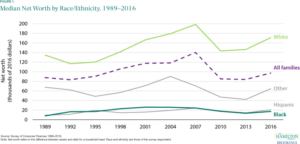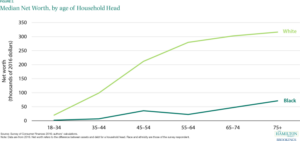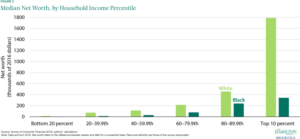Brookings Institute Examines the Wealth Gap Between Black and White Households
 There are several gaps that highlight the inequities between America’s Black and White citizens: Income inequality, incarceration rates, health care inequities, life span, and incidents of police brutality to name just a few. But no gap is wider than the wealth gap between the average White household which at $171,000 is ten times higher than that of the average Black household of $17,150, according to findings recently published by the Brookings Institute, a longtime think tank established in 1916.
There are several gaps that highlight the inequities between America’s Black and White citizens: Income inequality, incarceration rates, health care inequities, life span, and incidents of police brutality to name just a few. But no gap is wider than the wealth gap between the average White household which at $171,000 is ten times higher than that of the average Black household of $17,150, according to findings recently published by the Brookings Institute, a longtime think tank established in 1916.
Written by four economists, the article was published in February of 2020. This short and informative piece posts three charts detailing the gaps. The first shows gaps between White and other ethnic groups from 1989 on; the second shows the shows the gaps between Whites and Blacks by age brackets; and the third and perhaps most telling, charts the wealth gap between Blacks and Whites with identical incomes.
 Why these gigantic gaps in the United States? The article lists several historical impediments to Black accumulation of wealth, “beginning with 236 years of chattel slavery.” Interestingly but little known was the collapse of the Freedman’s Savings Bank that held deposits of former slaves. Its demise was blamed on mismanagement by Congress and left over 60,000 depositors with loses of over $3,000,000. Also noted was the violent and deadly destruction of Tulsa, Oklahoma’s Greenwood District where over 10,000 Black Americans thrived in an economic community so vibrant it garnered the name Black Wall Street.
Why these gigantic gaps in the United States? The article lists several historical impediments to Black accumulation of wealth, “beginning with 236 years of chattel slavery.” Interestingly but little known was the collapse of the Freedman’s Savings Bank that held deposits of former slaves. Its demise was blamed on mismanagement by Congress and left over 60,000 depositors with loses of over $3,000,000. Also noted was the violent and deadly destruction of Tulsa, Oklahoma’s Greenwood District where over 10,000 Black Americans thrived in an economic community so vibrant it garnered the name Black Wall Street.
Other well-known and harmful discriminatory practices such as Black Codes, Jim Crow laws, redlining, and unequal administration of New Deal policies and the GI Bill are cited along with informative links to each as impediments to Black folks accumulating the wealth near that of their White counterparts. Wealth that gets passed down generationally.
 Inherited wealth accounts for billions of dollars received annually, though far fewer Black households benefit which denies them the type of “safety” net that allows White households to better withstand economic downturns and stresses caused by events like Covid and the financial collapse of 2008.
Inherited wealth accounts for billions of dollars received annually, though far fewer Black households benefit which denies them the type of “safety” net that allows White households to better withstand economic downturns and stresses caused by events like Covid and the financial collapse of 2008.
The Brookings article poses no solutions but does point to wealth and inherited wealth that is taxed at far lighter rate than work is taxed. It is an enlightening read and gives a clear picture as to why there is such an enormous gap in wealth between the two groups.
